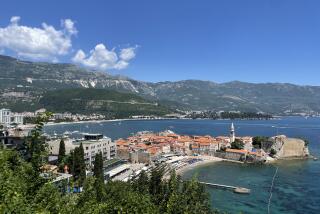The bad guys who got away
- Share via
THE WEST BLAMES the East, the East blames circumstances. Meanwhile, Europe’s two most-wanted men -- indicted Bosnian Serb war criminals Radovan Karadzic and Ratko Mladic -- have for the last 10 years freely roamed impoverished Bosnia-Herzegovina and Serbia-Montenegro with U.S. bounties of $5 million on their heads. In the minds of some of their die-hard supporters, these outlaws of the 1992-1995 Bosnian war have become romantic, almost glamorous, villains -- the Butch Cassidy and Sundance Kid, if you will, of the Balkans.
Why haven’t they been arrested? After a decade of lame excuses, NATO recently came up with a truly novel explanation. Maj. Gen. David Leakey announced that the fugitives were “very unlikely to be arrested soon” because coordinated international action had made it “virtually impossible for them to move around freely.” In other words, the NATO posse had been so effective at scaring them and encircling them as to preclude the possibility of nabbing them. Clever, huh?
It’s generally assumed that Mladic, indicted in the 1995 slaughter of thousands of Muslim men and boys in Srebrenica and other war crimes, is holed up somewhere in Serbia, where he could, presumably, be caught if authorities had the will and the skill.
Western intelligence agencies have regularly placed Karadzic, the former Bosnian Serb president held responsible for the ethnic cleansing of Bosnia, beyond Belgrade’s reach, possibly somewhere in the borderlands between Bosnia and Montenegro, a region of rugged mountains and secluded valleys where anti-Communist World War II fugitives holed up for as much as a decade after Europe was liberated. But this area too is well within the reach, if not the grasp, of NATO’s well-equipped, trained and mobile forces stationed in Bosnia.
Still, it doesn’t appear they’re going to be found very soon. After years of sitting on its hands, NATO, whose forces in Bosnia are now down to 7,000, has conveniently decided that it is not responsible for capturing the two men -- that it will take a Serb to catch a Serb.
AND IS that likely? As a result of wounded national pride, one can still find T-shirts, calendars, posters, lapel pins and wooden icons emblazoned with the faces of Karadzic and Mladic. Adept apologists themselves, the Serbs have matched NATO’s failure to arrest the famous outlaws, pathetic excuse for pathetic excuse. No one believes them, of course, but still nothing gets done.
It didn’t have to be this way. Ten years ago, when the International Criminal Tribunal in The Hague indicted Karadzic and Mladic on charges of genocide and crimes against humanity, NATO had 60,000 troops in Bosnia, which is smaller than West Virginia. For two years after the indictments, Mladic and Karadzic moved freely across Bosnia in full view of NATO forces, according to Carla Del Ponte, The Hague war crimes prosecutor.
“Karadzic was giving interviews and running party and state business with the full knowledge of the international community, while Mladic even participated in military ceremonies,” Del Ponte told the U.N. Security Council last month. In failing to arrest them, NATO put the safety of its troops above its obligation to arrest war criminals.
And now Serbia -- a small nation broken by civil wars and international sanctions, demoralized by the U.S.-led NATO bombing of 1999, rich only in lost causes -- stands to lose millions of dollars in U.S. aid if it does not deliver the two men to the tribunal in The Hague. But by opting to strong-arm a small nation, the West has engendered grass-roots hostility. The victims of sanctions will be the majority of Serbian citizens who are trying to rebuild their country, not the small number of die-hards who are protecting the outlaws. Serbia has already handed over two former presidents (notably Slobodan Milosevic), three generals, two chiefs of staff, one secretary of defense and scores of lesser-known indicted war criminals, in addition to two top spymasters. It has a democratic government led by men and women who defeated Milosevic twice in 2000, first at the polls and then in the streets when he tried to steal the election.
But the government hasn’t done everything it could. Mladic’s son was even permitted to collect his father’s army pension up until last month. The Serbian government has yet to freeze the fugitive’s assets.
It is sad that this region still fosters a culture of impunity, that it continues to ignore the air of coldblooded indifference shown by those who have been caught in the act.
More to Read
Sign up for Essential California
The most important California stories and recommendations in your inbox every morning.
You may occasionally receive promotional content from the Los Angeles Times.










